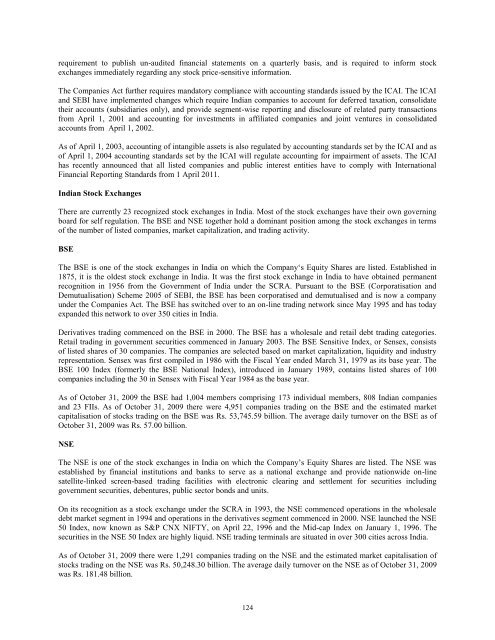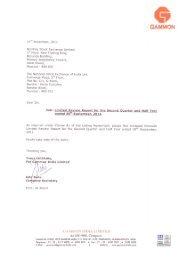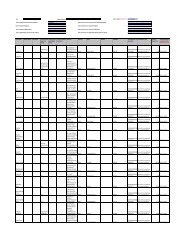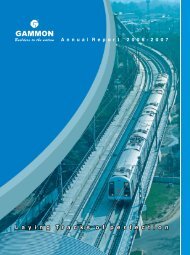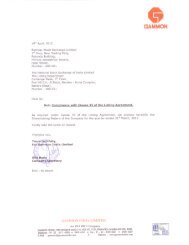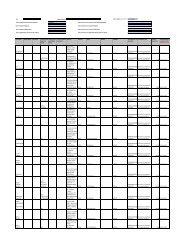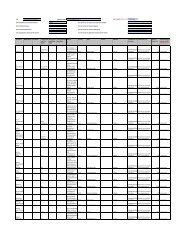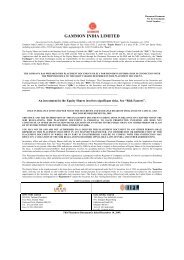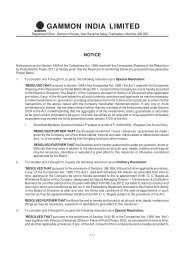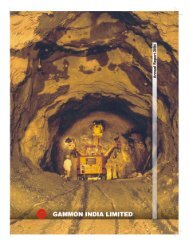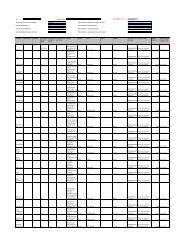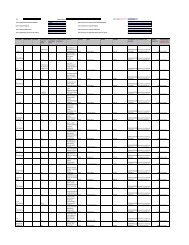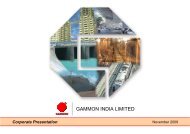GAMMON INDIA LIMITED
GAMMON INDIA LIMITED
GAMMON INDIA LIMITED
Create successful ePaper yourself
Turn your PDF publications into a flip-book with our unique Google optimized e-Paper software.
equirement to publish un-audited financial statements on a quarterly basis, and is required to inform stock<br />
exchanges immediately regarding any stock price-sensitive information.<br />
The Companies Act further requires mandatory compliance with accounting standards issued by the ICAI. The ICAI<br />
and SEBI have implemented changes which require Indian companies to account for deferred taxation, consolidate<br />
their accounts (subsidiaries only), and provide segment-wise reporting and disclosure of related party transactions<br />
from April 1, 2001 and accounting for investments in affiliated companies and joint ventures in consolidated<br />
accounts from April 1, 2002.<br />
As of April 1, 2003, accounting of intangible assets is also regulated by accounting standards set by the ICAI and as<br />
of April 1, 2004 accounting standards set by the ICAI will regulate accounting for impairment of assets. The ICAI<br />
has recently announced that all listed companies and public interest entities have to comply with International<br />
Financial Reporting Standards from 1 April 2011.<br />
Indian Stock Exchanges<br />
There are currently 23 recognized stock exchanges in India. Most of the stock exchanges have their own governing<br />
board for self regulation. The BSE and NSE together hold a dominant position among the stock exchanges in terms<br />
of the number of listed companies, market capitalization, and trading activity.<br />
BSE<br />
The BSE is one of the stock exchanges in India on which the Company‗s Equity Shares are listed. Established in<br />
1875, it is the oldest stock exchange in India. It was the first stock exchange in India to have obtained permanent<br />
recognition in 1956 from the Government of India under the SCRA. Pursuant to the BSE (Corporatisation and<br />
Demutualisation) Scheme 2005 of SEBI, the BSE has been corporatised and demutualised and is now a company<br />
under the Companies Act. The BSE has switched over to an on-line trading network since May 1995 and has today<br />
expanded this network to over 350 cities in India.<br />
Derivatives trading commenced on the BSE in 2000. The BSE has a wholesale and retail debt trading categories.<br />
Retail trading in government securities commenced in January 2003. The BSE Sensitive Index, or Sensex, consists<br />
of listed shares of 30 companies. The companies are selected based on market capitalization, liquidity and industry<br />
representation. Sensex was first compiled in 1986 with the Fiscal Year ended March 31, 1979 as its base year. The<br />
BSE 100 Index (formerly the BSE National Index), introduced in January 1989, contains listed shares of 100<br />
companies including the 30 in Sensex with Fiscal Year 1984 as the base year.<br />
As of October 31, 2009 the BSE had 1,004 members comprising 173 individual members, 808 Indian companies<br />
and 23 FIIs. As of October 31, 2009 there were 4,951 companies trading on the BSE and the estimated market<br />
capitalisation of stocks trading on the BSE was Rs. 53,745.59 billion. The average daily turnover on the BSE as of<br />
October 31, 2009 was Rs. 57.00 billion.<br />
NSE<br />
The NSE is one of the stock exchanges in India on which the Company‘s Equity Shares are listed. The NSE was<br />
established by financial institutions and banks to serve as a national exchange and provide nationwide on-line<br />
satellite-linked screen-based trading facilities with electronic clearing and settlement for securities including<br />
government securities, debentures, public sector bonds and units.<br />
On its recognition as a stock exchange under the SCRA in 1993, the NSE commenced operations in the wholesale<br />
debt market segment in 1994 and operations in the derivatives segment commenced in 2000. NSE launched the NSE<br />
50 Index, now known as S&P CNX NIFTY, on April 22, 1996 and the Mid-cap Index on January 1, 1996. The<br />
securities in the NSE 50 Index are highly liquid. NSE trading terminals are situated in over 300 cities across India.<br />
As of October 31, 2009 there were 1,291 companies trading on the NSE and the estimated market capitalisation of<br />
stocks trading on the NSE was Rs. 50,248.30 billion. The average daily turnover on the NSE as of October 31, 2009<br />
was Rs. 181.48 billion.<br />
124


